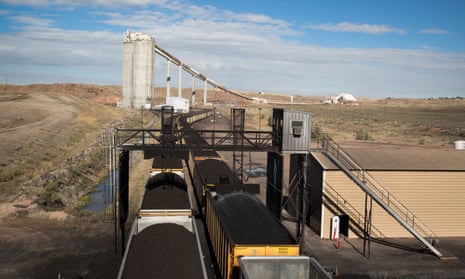Coal giant Peabody Energy has agreed to change the way it reports the risks posed to investors by climate change, ending an eight-year investigation by the New York attorney general.
Peabody and attorney general Eric Schneiderman confirmed they had reached an agreement on Monday, after the company was accused of issuing misleading statements on the risks it could face from tightening climate change laws.
Previously, Peabody has argued that it was unable to predict the impacts of future policy on its revenues, even though it had made internal projections that regulations could hit the business, a statement from Schneiderman’s office said.
Peabody has agreed to amend its disclosures but insisted it had not admitted wrongdoing, and faced no financial penalty.
The company said it would now provide a more comprehensive analysis of the International Energy Agency’s (IEA) world energy outlook scenarios, and include details on how future laws or regulations governing the coal industry could impact its business model.
The agreement came in the same week the IEA published its latest annual outlook, carrying a stark warning for the future of coal. Currently the world’s largest source of energy, the IEA predicts the coal market is heading for a “turbulent” period. Slowing demand from China and government efforts to attract cleaner sources of energy mean only 10% of new energy supplies will come from coal by 2040, according to the IEA.
The report details how the transition to a global low carbon energy system is gathering pace, with renewables set to become the largest source of new energy capacity over the next 35 years, largely at the expense of the coal market.
“As a publicly traded company whose core business generates massive amounts of carbon emissions, Peabody Energy has a responsibility to be honest with its investors and the public about the risks posed by climate change, now and in the future,” Schneiderman said in a statement. “I believe that full and fair disclosures by Peabody and other fossil fuel companies will lead investors to think long and hard about the damage these companies are doing to our planet.”
The attorney general’s office had discovered Peabody’s own internal projections showed that coal sales in the US could fall by at least 33% as a result of tough regulations on existing power plants in the US.
The attorney general also accused Peabody of presenting lopsided views of IEA reports, by choosing to report only on the “current policy scenario” which assumes governments fail to tighten up climate change policies, and ignoring the two other scenarios which paint a less favourable picture for coal growth.
Last week, it emerged ExxonMobil is facing a separate investigation by the New York attorney general’s office over whether it misled the public and investors over the scale of the climate risks the oil giant faces.
The New York Times revealed that Schneidermann has issued a subpoena to the company, calling for financial records, emails, and other documents relating to its work on climate change and its disclosures to the Securities and Exchange Commission.
The paper also reported for the first time that a long-running investigation had been underway into Peabody Energy relating to whether it has adequately reported on climate risks to investors.
ExxonMobil has rejected a series of recent allegations that it understood potential climate risks as early as the 1970s, while continuing to underplay the information and fund groups that cast doubt on mainstream climate science.
In related news that could deal a further blow to the global coal market, the US has reportedly struck a deal with Japan to reduce credit agency financing for coal projects, as part of efforts to tackle climate change.
According to the Financial Times, the plans will be debated at an OECD meeting in Paris next week.

Comments (…)
Sign in or create your Guardian account to join the discussion